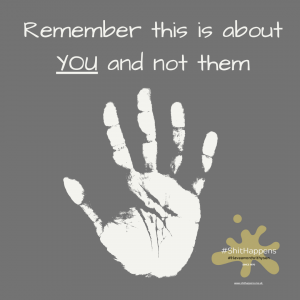
I don’t ever recall the word boundary being mentioned much growing up, my interpretation of a boundary looked like rules. Rules that had consequences if tested or broken – and trust me I broke many.
People misunderstand the purpose of boundaries; more often than not they are perceived as being a tactic or an enforcement tool in an attempt to manage another person’s behaviour or actions. And whilst setting and enforcing boundaries can do that to a certain extent, boundaries are only ever effective as the person enforcing them.
‘Why are boundaries are always seen or used as the last resort in an attempt to manage difficult behaviour or actions?’
I would advocate or even argue that we need to start looking at boundaries differently, in the first instance let us start referring to boundaries as an act of self-care. Using boundaries to help us build and restore our physical or emotional wellbeing. Especially, before we even attempt to apply them to others especially if you are using them to change someone else’s behaviour or actions.
I see this it all the time, particularly around families of addicts. Often the family’s attempts at establishing, enforcing, and maintaining boundaries almost always fail at the first hurdle, mainly because they are trying to enforce and manage boundaries at their weakest point.
“Life is hard enough being the person who has to think about, or even consider boundaries especially when it’s not your behaviour that’s the problem, let alone enforce them.”
Often addicts on the receiving of boundaries will go to great lengths and will do anything and everything they can to resist your efforts; they will argue, blame, ignore, manipulate, threaten, or physically hurt us.
“Trust me there is nothing worse than an addict who doesn’t get their way.”
Below is just a selection of some of the most common characteristics of addicts that families are up against
- Frequent lies
- Ignoring your boundaries
- Manipulating you to get what they want
- They don’t consider other people’s feelings or needs
- Feelings of entitlement
- They rarely apologize and if they do, it’s shallow, coerced, or worse – fake
- They will blame others and don’t take responsibility for their actions
- They will overreact
- Make unreasonable demands
- Have temper tantrums or fits of rage when they don’t get what they want
In a nutshell, their actions can create so much stress, anxiety, pain, which can affect your health, your ability to work, and your overall general wellbeing.
People often find themselves becoming co-dependent focusing more on how someone else can meet our needs rather than focusing on how to take care of ourselves.
And this is dangerous territory, its dangerous because quite often many family members or loved ones of addicts don’t seem to recognise just how bad their lives have been affected until it’s too late. They have been so consumed with fixing the addict and putting the needs of the addict first, that many are left feeling disorientated, disillusioned, and frustrated, with little or no energy left.
By establishing boundaries for ourselves we have a better fighting chance to start enforcing those boundaries that involve other people. This is particularly important when you are dealing with some of the above characteristics previously mentioned.
3 Points to consider
- The starting point for anyone living or dealing with an addicted loved one is first learning to accept that sometimes “nothing we do or say can or will prevent people from acting a certain way.” This can often be the hardest pill to swallow especially when someone has been stuck in rescue mode for a long time.
- The second point is learned to accept that what we can do is learn to set clear boundaries for ourselves, to take care of ourselves, protect ourselves, at least that way at we can and give ourselves a fighting chance to feel stronger and more empowered to take on anything that is thrown at us.
- Thirdly, when setting boundaries, it is vital to recognise your feelings and learn to differentiate yourself from the other person.
Benefits of personal boundaries
- When we set boundaries, we’re less angry and resentful because our needs are getting met
- Boundaries help us make our expectations clear, so others know what to expect from us and how we want to be treated.
- Boundaries are the foundation of happy, healthy relationships with others
- More importantly, boundaries are the foundation of a happy and healthy relationship with our selves.
Remember the purpose of setting your own personal boundaries is to let someone know you are not okay with their behaviour and the person who is one the other end of your boundary may still react. I know this all too well from personal experience.
When you are setting healthy boundaries, you are coming from a place of self-care and you find yourself in a better position to be able to acknowledge the other person’s reaction as opposed to trying to fix it.
I have come across this great No BS Guide to Protecting Your Emotional Space as a starting point to help start you off.
And my final WORD remember this is about YOU not them
I was recently asked to go on BBC Radio Sheffield to advise a lady called Louise whose life had been affected by her husband’s addiction to opiates you can click here to listen in (be warned its 20 mins long)




